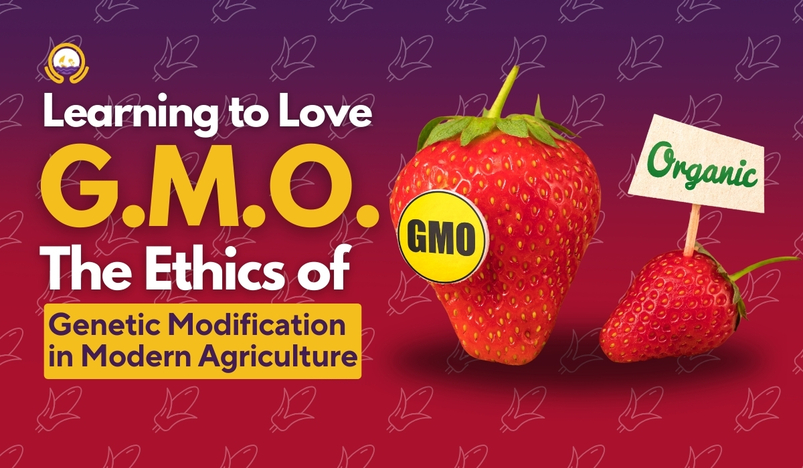
THE ETHICS OF GENETIC MODIFICATION IN AGRICULTURE
In the ongoing battle between progress and fear, the mere mention of GMOs (Genetically Modified Organisms) brings a frown on the faces of the misinformed, fueled by fear-mongering and baseless misconceptions. What really is the issue though?
In a world where as many as 828 million people – or 10% of the world's population – go to bed hungry each night (according to the United Nations Food and Agriculture Organization), is it not contemptuous to refuse acknowledging the benefits of a system that, although unconventional, could resolve low agricultural productivity and food insecurity on the planet.
First and foremost let's address the elephant in the room: fear. Fear of the unknown, fear of meddling with nature, and fear of potential harm. These fears are not only unfounded but detrimental to progress.
Unfounded fears have overshadowed the potential benefits that GMOs (Genetically Modified Organisms) can bring to the global food landscape - as a tool, a powerful one at that, which can address the growing global challenges of food security and environmental sustainability.
Possibly the most prevalent fear associated with GMOs is the idea of contamination, triggered by the perception that introducing DNA from seemingly repulsive species, such as rats or cockroaches, is inherently hazardous. However, it's crucial to recognize that DNA, regardless of its source, is a molecular code that carries information. The impact of disgust explains why people tend to be more averse to genetically modified food compared to other applications, like GM medicine. Once the emotion of disgust is evoked, claims that GMOs cause cancer, sterility, or environmental contamination become alarmingly convincing, perpetuating a cycle of misinformation.
Disgust not only influences public opinion but also affects moral judgments, leading to the condemnation of everyone involved in the development and commercialization of GM products. The unconscious nature of these judgments prompts individuals to seek rationalizations for their emotional reactions, creating a breeding ground for baseless arguments against GMOs.
Psychological essentialism is another factor shaping public perception. Viewing DNA as an organism's "essence," an unobservable core determining identity and behavior, fuels concerns that transferring genes between distantly related species will lead to the emergence of characteristics from the source organism in the recipient. For example, a survey in the United States revealed that more than half of respondents believed a tomato modified with fish DNA would taste like fish – a misconception that defies scientific reality.
Anti-GMO organizations capitalize on these intuitions, using images of tomatoes with fish tails and spreading misinformation about corn modified with scorpion DNA to manipulate public opinion. Such tactics exploit psychological biases and contribute to the persistent negative narrative surrounding GMOs.
Many arguments against GMOs hinge on the misconception that they are “not natural” or novel, reflecting a fundamental misunderstanding of the science behind our food. In reality, virtually everything we eat has undergone genetic modification, even if not classified as a "GMO." Our crops, shaped over thousands of years through careful breeding, contain genetic codes that differ significantly from their wild counterparts. So, what really is natural even?
Consider the evolution of corn as an illustrative example. Wild corn, known as teosinte, is tiny and unimpressive. Through a process of artificial selection, humans cultivated and selectively bred the best plants each year, gradually transforming teosinte into the large, juicy ears of corn we know today. This process, though inherently unnatural, is widely accepted and goes unnoticed because it occurred outside a laboratory setting.
If objections to GMOs stem from discomfort with organisms not found in nature, it's essential to recognize that virtually all our crops and livestock have been genetically modified through careful breeding. The distinction lies not in the process itself but in our perception of it.
Misconceptions surrounding GMOs not only hinder progress but also have implications for science education. Environmental benefits are often overshadowed by fear-mongering, but the truth is that GMOs can play a crucial role in sustainable agriculture. Crops engineered for drought resistance or reduced need for chemical pesticides can contribute to environmental conservation by minimizing resource use and mitigating the impact of agriculture on ecosystems.
The ethical dimension of genetic modification truly needs to be understood with patience and scientific research.
.jpg)
Qatar Secures Place Among the World's Top 10 Wealthiest Nations
.jpg)
Hamad International Airport Witnesses Record Increase in Passenger Traffic

Saudi Arabia: Any visa holder can now perform Umrah

What are Qatar's Labour Laws on Annual Leave?
Leave a comment